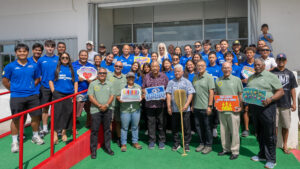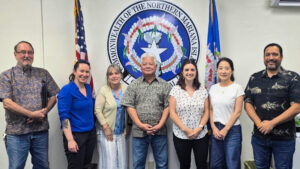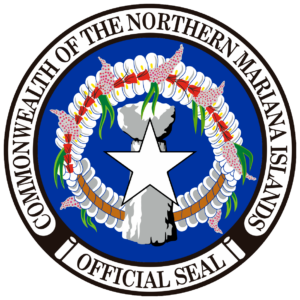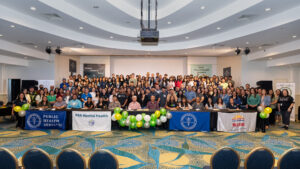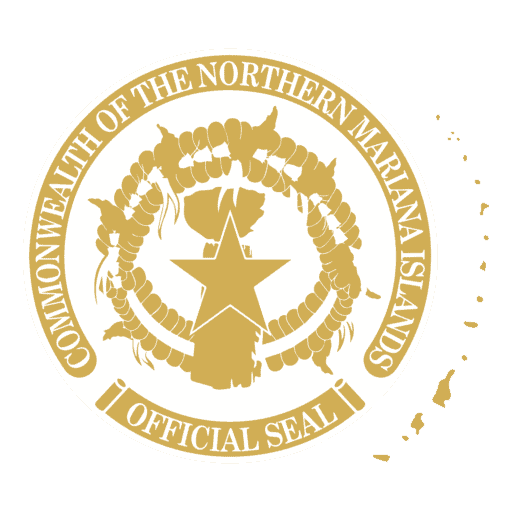Governor Ralph DLG. Torres on Wednesday expressed his appreciation to President Donald J. Trump and the US Citizenship and Immigration Services (USCIS) for modifying policies at his request regarding the CNMI-Only Transitional Worker (CW-1) visa program to protect the CNMI economy and workers.
USCIS announced on Wednesday that they will only apply the 30-day temporary departure (also known as touchback) requirement on CW-1 petitions approved on or after June 18, 2020.
Governor Torres first raised concern over the consequences the touchback requirement will cause to the CNMI economy almost immediately after its enactment into law in 2018. In his 2019 testimony before the U.S. Senate Energy and Natural Resource Committee, Governor Torres stated to the members of the Senate, “We must think of the practical application of requiring half of the current labor force to return to their countries of origin every two years while the economy sits and waits for the months of renewal processing. And we should closely monitor the implementation of these new provisions, so they do not undermine the economy and US jobs we worked so hard to build and protect.”
In early 2020, Lt. Governor Arnold I. Palacios testified before the U.S. House Natural Resources Committee and brought to light the impending implementation of the provision by stating, “At this time of severe financial difficulties, a dramatic reduction in the size of the labor force will compound our mounting challenges into a potential collapse of our economy.”
In a June 10, 2020 letter to USCIS, Governor Torres outlined how the temporary departure requirement at the expiration of the second renewal period for a CW-1 worker would set back the CNMI economy, negatively affect US workers, and endanger the livelihood of CW workers and their children.
“In any other circumstance, this impact to the labor force would be significant and warrant reconsideration. In the present scenario, with the unprecedented harm brought by the COVID-19 pandemic, this will be devastating,” wrote Governor Torres in his letter to USCIS.
“Already, businesses across the Commonwealth are closing their doors, never to reopen. The businesses that remain will have to contend with diminished demand and an outlook more uncertain than any other time in recent history. To add to these difficulties, their trained workforce will be required to depart for an indeterminate amount of time during a period in which government services will rely upon at least a partial resumption of economic activity,” the Governor said.
In his letter, Governor Torres reemphasized his commitment to ensure that the future labor force of the CNMI is comprised of skilled and competent local workers, but added that the original USCIS policy would lead to more business closures, a reduction in CW fees to train local US workers, and negatively affect the CNMI’s healthcare system.
“The increased costs of retaining existing employees will result in further business closures as it will compound the effects existing from the COVID-19 pandemic. The decrease in private sector activities will impact employment opportunities for U.S. workers, especially those who have been furloughed from government employment. What is likely, will be a mass outward migration of our local labor force to neighboring Guam or the U.S. mainland. This is what we lived through in the advent of U.S. Public Law 110-229 and has severely impacted our present-day ability to make sizable gains in the domestic workforce population,” said Governor Torres.
“An impact of this magnitude, coupled with the diminished demand present in today’s economy, will reduce the number of petitions for the CW-1 permit this Fiscal Year. While counter-intuitive, this is harmful because as the CNMI government restructures and other commercial enterprises close, there will be a need for workforce retraining to transition out-of-work domestic employees. It is important to note that the only resources the CNMI receives to directly assist in the transition period originates from CW-1 petition fees. This provision, the impact it will have on commercial activity, and the decrease in labor demand through the program will reduce the resources the CNMI relies upon to train U.S. workers. Without additional resources, these U.S. workers will be greatly impacted and the CNMI’s progress toward transition will be severely stunted,” he added.
Governor Torres said in his letter that the temporary departure requirement would come at a bad time when the CNMI is battling COVID-19.
“The temporary departure requirement comes at a time when the CNMI healthcare system can least afford a loss in labor force. In recent communications with the Commonwealth Healthcare Corporation (CHCC), the CNMI’s sole hospital, the Temporary Departure Requirement will affect 54 critical healthcare workers including Registered Nurses, and Clinical Laboratory Scientists. With the global pandemic still impacting health care systems around the world, the isolated and already diminished healthcare system of the CNMI will suffer greatly in the loss of these workers during their departure period,” he said.
As a result of Governor Torres’ request, USCIS said in their press release that they will implement the temporary departure requirement in a manner that best protects the interests of CW-1 employers and workers who may be affected by potential travel disruptions and delays beyond their control. This change also minimizes the likely negative impact on other U.S. businesses and prevents further damage to the CNMI economy.
“We have been consistent and proactive in our message that this provision will harm our community in truly profound ways. The COVID-19 pandemic has affected all of us in many ways. While we continue to remain one of the safest places in the world because of our proactive measures to protect our islands, our economy has taken an unprecedented hit. Protecting our economy, our businesses, and most especially our local US and CW workers and their families are important to me as we plan our economic recovery together as a community,” he said.
“I thank Congressman Gregorio Kilili Sablan for lending an ear to the concerns the CNMI brought to Congress on this provision of U.S. law and for working with my administration to advocate for this momentary change and the eventual amendment to the law that authorized it, and a great level of appreciation must be given to our private sector partners, and the Northern Mariana Business Alliance Corporation for the advocacy and support of our economy.”
“We are Marianas strong when we look out for one another and support each other. From protecting the health of our man’amko to protecting our businesses to protecting workers and their families, every person who calls these islands home is important to me, and Lt. Governor Palacios and I will continue to safeguard our people from any challenge that comes our way,” said Governor Torres.
# # #


